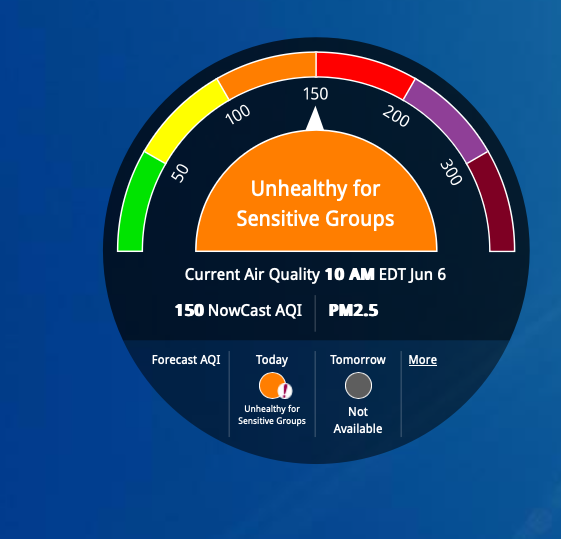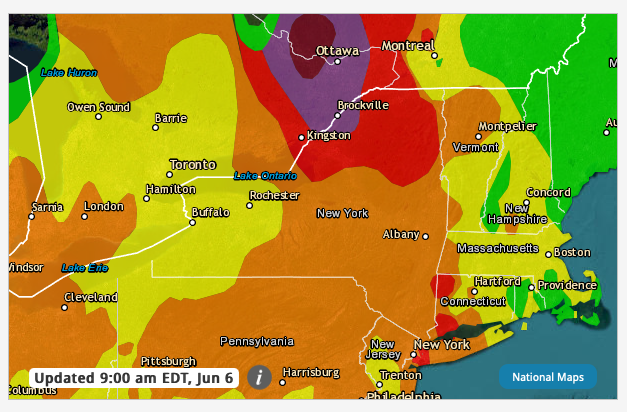Living with asthma requires vigilance and proactive management to maintain optimal respiratory health. In recent years, the increasing prevalence of wildfires has added an additional layer of complexity to asthma management, with the potential for asthma exacerbation due to wildfire smoke. Throughout the following post, we explore the profound impact of wildfire smoke on individuals with asthma and discuss when it is crucial for asthma patients to seek urgent care.
The Impact of Wildfire Smoke on Asthma:
Wildfire smoke poses a significant risk to individuals with asthma, as the fine particles and toxic chemicals released during combustion can trigger respiratory distress and exacerbate asthma symptoms. Understanding the connection between wildfire smoke and asthma is vital for protecting respiratory health during these environmental challenges.


Understanding Wildfire Smoke:
- Wildfire smoke is a complex mixture of gases, particulate matter, and toxic chemicals generated by burning organic materials during wildfires. The smoke contains fine particles, such as PM2.5, which can deeply penetrate the lungs and trigger inflammation and constriction of the airways, leading to asthma symptoms.
Asthma Exacerbation Due to Wildfire Smoke:
- Exposure to wildfire smoke can cause asthma symptoms to worsen. The severity of symptoms varies depending on factors such as particle size, proximity to the fire, and duration of exposure. Individuals with asthma may experience coughing, wheezing, shortness of breath, chest tightness, and an increased risk of asthma attacks.
Preventive Measures:
- To mitigate the risks associated with wildfire smoke, individuals with asthma should stay informed about air quality advisories and wildfire updates. Creating a safe indoor environment by closing windows, using air purifiers, and limiting outdoor activities during peak smoke hours can help reduce exposure. Developing an asthma action plan with a healthcare provider is also crucial for managing asthma symptoms during wildfire events.
When to Seek Urgent Care for Asthma Patients:
Despite diligent asthma management, there may be instances when symptoms worsen unexpectedly or become severe, necessitating urgent medical attention. Recognizing these situations and knowing when to seek urgent care is essential for asthma patients’ well-being.
Severe Symptoms:
- If asthma symptoms become severe, such as extreme shortness of breath, rapid breathing, or persistent wheezing, it is crucial to seek immediate medical attention. These signs may indicate a severe asthma attack that requires urgent intervention.
Inadequate Response to Medication:
- If symptoms do not improve or worsen despite using prescribed rescue medications, it suggests inadequate control of asthma. Seeking urgent care allows healthcare professionals to assess the situation, adjust medications if necessary, and provide appropriate interventions.
Prolonged Symptoms:
- When asthma symptoms persist for an extended period, even with adherence to the prescribed treatment plan, it is advisable to seek medical evaluation. Unrelenting symptoms lasting for hours or days may require further assessment and adjustment of the asthma management plan.
Respiratory Distress:
- Extreme difficulty breathing, rapid breathing, or a bluish tinge on the lips or fingertips indicates a critical situation requiring immediate medical attention. These symptoms may indicate severe oxygen deprivation and demand urgent evaluation.
Uncertainty or Concerns:
- When unsure about the severity of symptoms or having concerns about asthma management, seeking guidance from healthcare professionals at an urgent care facility is prudent. They can provide expert evaluation, advice, and reassurance to help navigate asthma care more effectively.
Living with asthma in the midst of wildfire season presents unique challenges. Understanding the impact of wildfire smoke on asthma exacerbation is essential for individuals with asthma. Additionally, recognizing when to seek urgent care in situations of severe symptoms, inadequate medication response, prolonged symptoms, respiratory distress, or uncertainty is crucial. By combining preventive measures to minimize exposure to wildfire smoke and knowing when to seek prompt medical attention, asthma patients can proactively manage their condition, safeguard their respiratory health, and ensure a better quality of life amidst environmental challenges.
